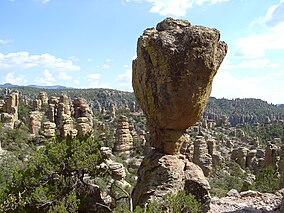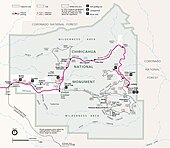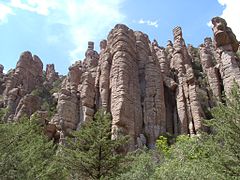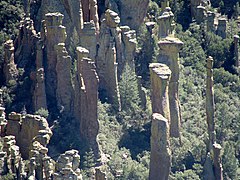Chiricahua National Monument
| Chiricahua National Monument | |
|---|---|
IUCN category V (protected landscape/seascape) | |
 Rock formation on Echo Canyon Trail | |
Location in Arizona | |
| Location | Cochise County, Arizona, United States |
| Nearest city | Willcox, Arizona |
| Coordinates | 32°00′20″N 109°21′24″W / 32.00569°N 109.35672°W |
| Area | 12,025 acres (48.66 km2)[1] |
| Created | April 18, 1924 |
| Visitors | 60,577 (in 2018)[2] |
| Governing body | National Park Service |
| Website | Chiricahua National Monument |
Chiricahua National Monument is a unit of the National Park System located in the Chiricahua Mountains of southeastern Arizona. The monument was established on April 18, 1924, to protect its extensive hoodoos and balancing rocks. The Faraway Ranch, which was owned at one time by Swedish immigrants Neil and Emma Erickson, is also preserved within the monument.[3]
Just over 85% of the monument is protected as the Chiricahua National Monument Wilderness.[4]
Visitor center
[edit]
A visitor center is located 2 miles (3.2 km) from the entrance to Chiricahua National Monument. The visitor center has exhibits relating to the geology, natural history, and cultural history of the area. A park ranger is available to provide visitors with trail guides and information. The main road, Bonita Canyon Drive, ventures 8 mi (13 km) east through the park, ending at Massai Point. Approximately 17 mi (27 km) of trails lead hikers through various ecosystems of meadows, forests, and rock formations.
The visitor center has a free shuttle that leaves each morning at 9:00 am. The shuttle takes hikers to the Echo Canyon or Massai Point trailheads. Hikers return to the visitor center by following the designated trails.[5]
Geology
[edit]Located approximately 36 miles (58 km) southeast of Willcox, Arizona, the monument preserves the remains of an immense volcanic eruption that shook the region about 27 million years ago. The thick, white-hot ash spewed forth from the nearby Turkey Creek Caldera, cooled and hardened into rhyolitic tuff, laying down almost 2,000 ft (610 m) of highly siliceous, dark volcanic ash and pumice. The volcanic material eventually eroded into the natural rock formations of the present monument.[6]
Historic Designed Landscape
[edit]Chiricahua National Monument Historic Designed Landscape | |
| Location | 12856 E. Rhyolite Canyon Rd., Chiricahua National Monument, near Willcox, Arizona |
|---|---|
| Area | approx. 10,000 acres[8] |
| Built | 1924–1940[8] |
| MPS | Historic Park Landscapes in National and State Parks MPS |
| NRHP reference No. | 08001020[7] |
| Added to NRHP | October 31, 2008[7] |
Chiricahua National Monument Historic Designed Landscape is a historic district that covers roughly 80% of the national monument. The district was listed on the National Register of Historic Places on October 31, 2008.[7][8][9]
It was the 18th property listed as a featured property of the week in a program of the National Park Service that began in July, 2008.[7][10]
Redesignation as National Park
[edit]In 2022, the US Senate passed S. 1320 to redesignate the monument as a national park.[11][12] The bill did not make it out of committee in the House and died with the conclusion of the 117th Congress. In early 2023, Senator Mark Kelly introduced S 736 in the Senate, while Representative Juan Ciscomani introduced HR 1479 in the House to redesignate the Monument as a Park.[13][14] The 2023 bills passed out of committee in the Senate but have not passed out of committee in the House.
Missing naturalist
[edit]On January 13, 1980, Paul Fugate, a National Park Service naturalist and law enforcement ranger, disappeared after leaving the monument headquarters while in uniform, to check trails leading to the recently acquired Faraway Ranch. An acquaintance claimed to have seen him later that afternoon, slumped between two men in a pickup truck. Despite an extensive search of the rugged 17 sq mi (44 km2) monument area by authorities and search and rescue teams, no trace of him has been found.[15][16][17]
Gallery
[edit]-
Big Balanced Rock along the Heart of Rocks trail
-
Stone columns, called hoodoos, are the most common formation in the monument
-
Hoodoos in Totem Canyon
Climate
[edit]According to the Köppen Climate Classification system, Chiricahua National Monument has a hot-summer mediterranean climate, abbreviated "Csa" on climate maps. The hottest temperature recorded at Chiricahua National Monument was 109 °F (42.8 °C) on July 13, 1909, while the coldest temperature recorded was −10 °F (−23.3 °C) on January 7, 1913.[18]
| Climate data for Chiricahua National Monument, Arizona, 1991–2020 normals, extremes 1909–2007 | |||||||||||||
|---|---|---|---|---|---|---|---|---|---|---|---|---|---|
| Month | Jan | Feb | Mar | Apr | May | Jun | Jul | Aug | Sep | Oct | Nov | Dec | Year |
| Record high °F (°C) | 80 (27) |
80 (27) |
86 (30) |
93 (34) |
104 (40) |
108 (42) |
109 (43) |
103 (39) |
100 (38) |
95 (35) |
85 (29) |
82 (28) |
109 (43) |
| Mean daily maximum °F (°C) | 56.0 (13.3) |
60.6 (15.9) |
66.5 (19.2) |
73.8 (23.2) |
82.7 (28.2) |
91.4 (33.0) |
90.2 (32.3) |
86.7 (30.4) |
83.8 (28.8) |
76.4 (24.7) |
66.4 (19.1) |
55.7 (13.2) |
74.2 (23.4) |
| Daily mean °F (°C) | 43.1 (6.2) |
46.6 (8.1) |
51.5 (10.8) |
57.2 (14.0) |
65.7 (18.7) |
74.2 (23.4) |
75.1 (23.9) |
73.4 (23.0) |
70.2 (21.2) |
61.8 (16.6) |
52.0 (11.1) |
43.1 (6.2) |
59.5 (15.3) |
| Mean daily minimum °F (°C) | 30.3 (−0.9) |
32.6 (0.3) |
36.5 (2.5) |
40.5 (4.7) |
48.8 (9.3) |
57.0 (13.9) |
60.0 (15.6) |
60.0 (15.6) |
56.6 (13.7) |
47.2 (8.4) |
37.5 (3.1) |
30.5 (−0.8) |
44.8 (7.1) |
| Record low °F (°C) | −10 (−23) |
7 (−14) |
10 (−12) |
20 (−7) |
19 (−7) |
35 (2) |
40 (4) |
44 (7) |
33 (1) |
21 (−6) |
8 (−13) |
−1 (−18) |
−10 (−23) |
| Average precipitation inches (mm) | 1.32 (34) |
1.28 (33) |
1.19 (30) |
0.27 (6.9) |
0.30 (7.6) |
0.86 (22) |
3.81 (97) |
4.56 (116) |
1.59 (40) |
0.99 (25) |
1.04 (26) |
1.50 (38) |
18.71 (475.5) |
| Average snowfall inches (cm) | 1.3 (3.3) |
0.5 (1.3) |
0.2 (0.51) |
0.0 (0.0) |
0.0 (0.0) |
0.0 (0.0) |
0.0 (0.0) |
0.0 (0.0) |
0.0 (0.0) |
0.1 (0.25) |
0.4 (1.0) |
1.2 (3.0) |
3.7 (9.36) |
| Average precipitation days (≥ 0.01 in) | 5.4 | 5.4 | 4.6 | 2.0 | 2.2 | 3.5 | 13.1 | 12.6 | 6.3 | 4.2 | 4.0 | 5.5 | 68.8 |
| Average snowy days (≥ 0.1 in) | 0.5 | 0.5 | 0.1 | 0.0 | 0.0 | 0.0 | 0.0 | 0.0 | 0.0 | 0.1 | 0.2 | 0.4 | 1.8 |
| Source 1: NOAA[19] | |||||||||||||
| Source 2: National Weather Service[18] | |||||||||||||
See also
[edit]- List of national monuments of the United States
- National Register of Historic Places listings in Cochise County, Arizona
References
[edit]- ^ "National Park Service Acreage Reports". Retrieved January 31, 2022.
- ^ "NPS Annual Recreation Visits Report". National Park Service. Retrieved April 1, 2019.
- ^ "Chiricahua National Monument: Nature & Science". National Park Service. Retrieved July 3, 2011.
- ^ "Wilderness Connect". wilderness.net. Retrieved August 31, 2019.
- ^ "Chiricahua National Monument (U.S. National Park Service)". www.nps.gov. Retrieved April 16, 2018.
- ^ "Geology Field Notes: Chiricahua National Monument, Arizona". National Park Service. Retrieved July 3, 2011.
- ^ a b c d "Announcements and actions on properties for the National Register of Historic Places, November 7, 2008". New listings. National Park Service. Retrieved November 12, 2008.
- ^ a b c Pinto, Robin Lothrop and R. Brooks Jeffery and Mike Lovato (May 21, 2007). "National Register of Historic Places Nomination: Chiricahua National Monument Historic Designed Landscape / Wonderland of Rocks / Rhyolite Park / The Pinnacles/ Say Yahdesut "Point of Rocks"" (PDF). National Park Service. Archived from the original (PDF) on May 26, 2017. (268 pages including 17 maps and 199 photos, exterior and interior)
- ^ "National Register Information System". National Register of Historic Places. National Park Service. March 13, 2009.
- ^ "Weekly List Actions". National Park Service. Retrieved November 12, 2008.
- ^ Kelty, Bennito L. "Senate OKs bill to establish Chiricahua National Park, measure still awaits House action". TucsonSentinel.com. TucsonSentinel.com. Retrieved January 2, 2023.
- ^ "S.1320 — 117th Congress (2021-2022)". congress.gov. Library of Congress. Retrieved January 2, 2023.
- ^ US Congress (July 19, 2023). "Senate Bill 736, 118th Congress". Congress.gov. Retrieved March 25, 2024.
- ^ US Congress, Library of Congress (March 22, 2023). "All Information (Except Text) for H.R.1479 - Chiricahua National Park Act". Congress.gov. Retrieved March 25, 2024.
- ^ "The Mystery of a Missing Naturalist May Lead to Legal Test of Dismissal". New York Times. August 16, 1981. p. 63. Retrieved May 20, 2018.
- ^ Smith, Rick (March 5, 2009). "Where in the World is Paul Fugate?". National Parks Traveler. nationalparkstraveler.org. Retrieved May 20, 2018.
- ^ Borrell, Brendan (July 1, 2021). "The Search for a Ranger Who Was Lost and Never Found". Outside. Retrieved December 8, 2023.
- ^ a b "NOAA Online Weather Data – NWS Tucson". National Weather Service. Retrieved March 26, 2023.
- ^ "U.S. Climate Normals Quick Access – Station: Chiricahua NM, AZ". National Oceanic and Atmospheric Administration. Retrieved March 26, 2023.
External links
[edit] Media related to Chiricahua National Monument at Wikimedia Commons
Media related to Chiricahua National Monument at Wikimedia Commons- Chiricahua National Monument – National Park Service
- The Search for a Ranger Who Was Lost and Never Found April 1, 2021
- IUCN Category V
- 1924 establishments in Arizona
- Chiricahua Mountains
- Landforms of Cochise County, Arizona
- National Park Service national monuments in Arizona
- Protected areas established in 1924
- Protected areas of Cochise County, Arizona
- Rock formations of Arizona
- Douglas, Arizona
- Historic districts on the National Register of Historic Places in Arizona
- Geography of Cochise County, Arizona
- National Register of Historic Places in Cochise County, Arizona
- National Park Service rustic in Arizona






